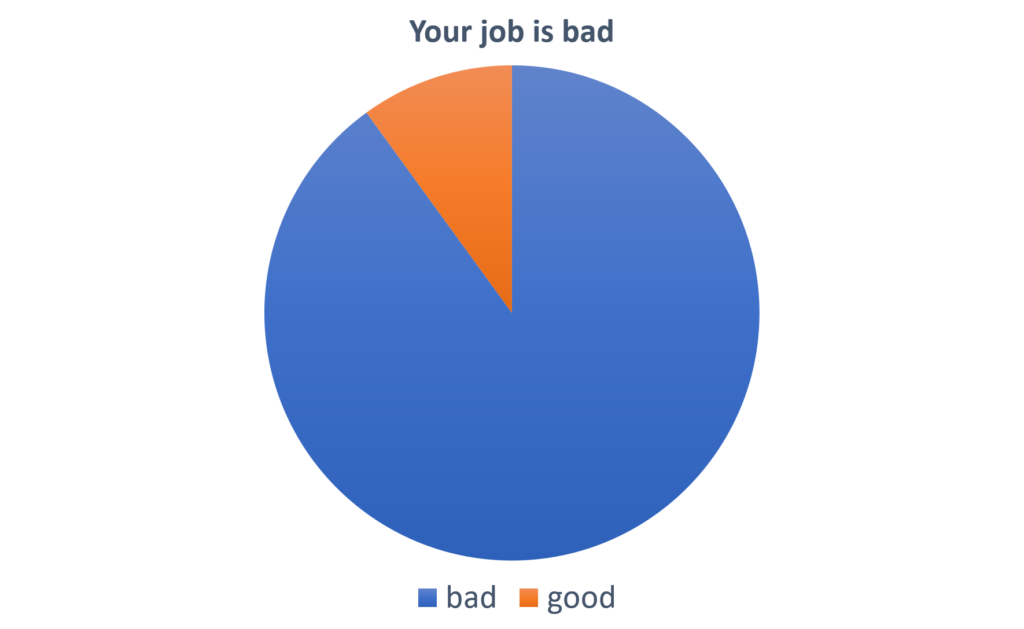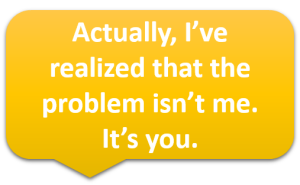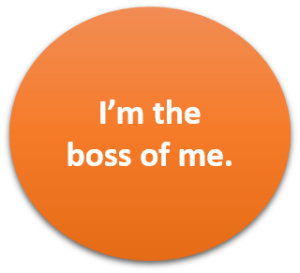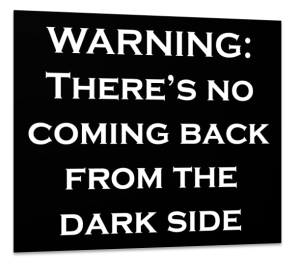Tag: opting out
Know when to go
A common mistake among people who quit their jobs is that they wait too long to do it. When things start going badly, it’s natural to ignore it at first, and then take a wait-and-see approach, hoping it will get better. If it doesn’t, you might find that your self-esteem erodes, your health suffers, and you start to doubt whether you can find a better job somewhere else.
It is especially difficult if you are in a specialized field, or if you live in a place with few other employers. You might feel trapped.
You’re probably not trapped.

Yes, quitting whenever you want is a privilege for those with wealth and opportunities. But if you’re earning an income, you can take steps to build up your bank account and create more choices for yourself. I wrote about this in more detail in my Savings = Options blog from 2014.
Beyond financial needs, the biggest blocker is often a person’s own mindset. It’s easy to get discouraged and lose sight of possibilities. When you’re in a negative work environment for an extended time period, you can develop a trauma-like response. Your mind starts filtering out the wider world because you’re in survival mode, focusing only on what’s in front of you.
It can be hard to pull yourself out of that state, but people do it every day. Just knowing that fear distorts perception is a start. Don’t believe everything you think about yourself.
Ask people you trust if you have an accurate belief in your employability. I was once asked by a very clever person who had a solid track record in his day job and a successful side hustle if I thought that other companies would want to hire him. Yes! Definitely!
Another thing that people do when they’re struggling with a bad job is to find reasons not to pursue new ones. People invent justifications before investigating whether their assumptions are true or not.
“That company’s office is too far away, and I hate to commute.” Maybe. But maybe they would let you work at home part of the time, or if it is a tech giant, maybe they have a free corporate shuttle with Wi-Fi. Or your work schedule would let you miss the worst of heavy traffic. You won’t know if you don’t pursue the role in the first place.
Leaving the Good with the Bad
 Rarely are bad jobs all bad. You might have an easy commute, nice work friends and decent wages mixed in with a nasty boss and brutal hours. One of the toughest hurdles to overcome when you are making up your mind to quit your job is accepting the loss of the good parts you will leave behind.
Rarely are bad jobs all bad. You might have an easy commute, nice work friends and decent wages mixed in with a nasty boss and brutal hours. One of the toughest hurdles to overcome when you are making up your mind to quit your job is accepting the loss of the good parts you will leave behind.
It is normal to cling to the positive parts within a bad situation. It has a purpose: it keeps you stuck in the decision-making phase, which is uncomfortable but not as scary as walking away from a significant aspect of your life and facing the uncertainties in your future.
It is also tempting to overemphasize the positive while downplaying the negative. But if you dread going to work and can’t shake off the stress when you’re done for the day, your job is bad for you. Even if you love the project you’re working on and got a raise last month, if your job makes you unhappy – it’s bad.
It’s ok to grieve your losses and be nervous about whether you’ll enjoy your next work position. Giving up something you care about isn’t easy. Deciding to let go of the good in order to be free from the bad is brave – and worth it.
If you are struggling with your toxic work environment – good
If you are struggling with your toxic work environment – good. 
I’m sorry that you’re in a negative work situation, but the fact that you’re struggling with it is positive.
If you are resistant when your management instructs you to take actions that are bad for customers or waste shareholder money – good. You care about doing the right thing.
If you are caught between the need to speak up about workplace bullying and the need to keep your paycheck and healthcare benefits – good. Your ethics are showing.
If the subtle, persistent discrimination against certain employees leaves you feeling drained – good. Your body itself is signaling that you are in a dangerous environment.
I am sorry that you are in a job that harms your wellbeing. However, I am glad that you are reacting negatively to a noxious job situation. Your struggle reflects your morality and your desire for fairness. You have integrity. You are in touch with human decency.
I am not worried about your humanity.
I am worried about the other people, the ones who succeed in toxic work environments.
Employees who heartily laugh along with their manager’s discriminatory jokes and respond positively when others are harassed are encouraging this behavior to persist.
Employees that willingly support management decisions that waste time and money are also guilty of wasting time and money.
Employees that unscrupulous managers rely on to support their unethical tactics are also behaving unethically.
People that thrive in toxic work environments perpetuate them. They care more about advancing their careers than they care about integrity.
So, if you are struggling to survive in a toxic work environment – good.
I hope that you advocate for change that improves the situation for you and your coworkers. If that is not possible, save yourself and change jobs before you sink into a pit of stress, depression or low self-esteem.
Most importantly: I hope you keep your integrity.
Regaining Confidence After a Bad Work Experience
 Bad jobs can hurt our souls. Humans thrive on contributing to things larger than ourselves, being productive, positive interactions with others and recognition for our efforts. A job is much more than a means to pay the bills.
Bad jobs can hurt our souls. Humans thrive on contributing to things larger than ourselves, being productive, positive interactions with others and recognition for our efforts. A job is much more than a means to pay the bills.
When a rotten manager tells you your work isn’t good enough – or you’re not good enough, it wounds your spirit. When coworkers blame and shame you, it rips little holes in your psyche. Even if you know that you add value to your company and that you do good work, even if you think your managers and their minions are idiots — constant negative feedback is damaging.
Many people who I’ve spoken with about quitting their jobs told me they lost confidence in themselves because of bad work experiences. These are people who have grown their careers, earned advanced degrees, or led initiatives that made millions of dollars for their companies. Some of them have tough reputations, and aren’t especially sensitive to criticism. Yet the negativity they endured made them unsure of themselves.
If you haven’t experienced a job like this and you’re not close to someone who has, you might be thinking, “If they were such great workers, why did their managers treat them so poorly?” Well, that is the reality of many organizations – whether military, education, corporate, religious or any other field — there is dysfunction. Often a team needs a scapegoat to blame for poor results, or to use as a target to vent their own insecurity and anger. Sometimes it is the company culture. Sometimes it is just crazy-making.
Feeling insecure about your value as an employee is not a great state to be in when searching for a new job. Interviewers can smell fear, and if you’re questioning your abilities, you may settle for a job you don’t want or accept a lower salary than you deserve.
It took some people two or three years to regain their confidence and self-esteem after a terrible job, regardless of whether they were fired or quit on their own. Ugh. That is too long to let the jerks continue to have power over you. Fortunately, it doesn’t have to be this way. The people who bounced back quickly have this advice:
- Take back your power right now. Remind yourself as many times a day as you need to that this is your life. You get to choose whether you tell your coworkers “don’t talk to me like that” or quietly plot your exit while biting your tongue.
- You are more than your job. You are not your title, your company, or your salary. You are a whole person with many parts to your life. Know that your value as a human being is based on many things, but how your boss treats you is not one of them.
- You have skills and talents. When you feel low because you only hear what your manager thinks you are doing wrong, remember what you are good at. Write a list of your positive work traits if you need to. Take the Strength Finders test. Think of all you have accomplished in the past. When you’re scanning the job listings or updating your resume, this is the frame of mind to be in.
If you’ve left a horrible job or are currently in one, I hope you hold onto your self-worth and use what you’ve learned about the experience. You may come out on the other side with clearer boundaries, greater awareness of your strengths, and the confidence that comes from knowing that actually you are the boss of your own life.
Did Your Manager Go to the Dark Side?
 As I researched the topic of people quitting their jobs, I heard a lot of stories about evil managers. No surprise, right? Unfortunate employees across all industries had tales of harassment, corruption, and behavior that would be shocking if it wasn’t so prevalent.
As I researched the topic of people quitting their jobs, I heard a lot of stories about evil managers. No surprise, right? Unfortunate employees across all industries had tales of harassment, corruption, and behavior that would be shocking if it wasn’t so prevalent.
The saddest stories I heard were the ones about bosses that didn’t used to be evil. Their ex-employees told me that some of them used to be great. They were effective leaders who clearly communicated expectations and treated their staff with respect. There was mutual trust and positive manager/employee interactions.
What made these bosses go to the dark side?
- The managers’ workloads skyrocketed and they did not have the support of their own bosses.
- They were promoted to higher levels and as their egos inflated, their people skills declined.
If you have a boss who turned evil and you’re clinging to the shreds of the person he or she used to be, your odds aren’t good. I only heard one story about a bad boss who became more supportive of her staff as her home life improved. But she was one who started out evil. I didn’t find any stories of people making it back from the dark side once they crossed over.
It can be cathartic to share stories of nasty bosses, but I’d rather learn something from these scenarios. First, if you’re reporting to a bad boss, you know it probably won’t get better. Now is a good time to start planning your next career move.
Second, there’s an opportunity for self-reflection and choice. When I worked in a difficult environment and was constantly stressed, scrambling to meet last-minute deadlines, and exhausted, I didn’t have my full set of interior resources to draw upon. It took much more effort and energy to put the Dale Carnegie and Emotional Intelligence skills I’d learned to use. I had less time to help others and less patience with mistakes. I didn’t like that my behavior and attitude could be negatively impacted by my job. When I changed careers, one of my priorities was to work in environments that enabled the best version of me to show up more often than not.
Leave the evil bosses behind.
And when you grow your own career, remember the warning signs. Don’t go to the dark side.
Employee Stress vs. Entrepreneur Stress
I had stress when I worked a full-time corporate job. I have stress now. What’s the difference?
Corporate stress came from unrealistic workloads, office politics and being asked to participate in business decisions that I disagreed with. Working in a stressful environment is like breathing in low levels of poisonous air every day. It won’t kill you all at once. It is a long, slow decline.
Entrepreneur stress is completely different. It is the flip side of the positives parts of working on my own. It comes from the pressure I put on myself to spend more time on my projects. It’s learning Quickbooks and all kinds of marketing and operational tasks that I used to have corporate resources to help me execute. It’s the uncertainty of not having a scripted career path.
This kind of stress is much easier to live with. I can decide how many hours to spend on my business and writing projects. I can outsource tasks that aren’t my strong points and that I don’t enjoy doing. I can tame my thoughts when I worry.
All stress is not created equal.
Opting Out or Opting In?
A few months ago someone asked me if the change I made in my career was opting out of something or opting in.
Great question. The answer is both.
I opted out of a work environment that no longer fit me. I said no to long, exhausting hours spent on tasks that were required for my role but that I didn’t believe in. I said goodbye to a false sense of security that comes with a company job. I left work that I enjoyed because the price I paid for doing that work wasn’t worth it anymore.
I opted in to choosing work that supports the kind of life I want to live. I said yes to deciding how to spend my time and energy. I said hello to feeling both uncertain and exhilarated about the possibilities for my future. I began writing and consulting work which isn’t always fun but is worth every moment.
Sometimes it is about saying no in order to say yes.

Recent Comments